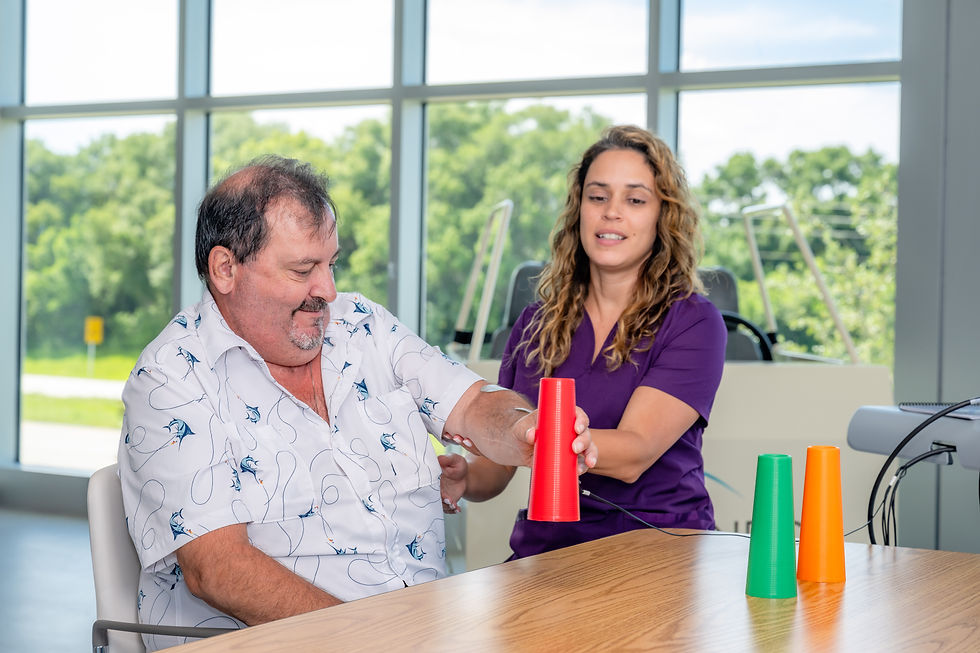Stroke Rehabilitation - How Patients Benefit from Speech Therapy
- Indianapolis Rehabilitation Hospital
- Mar 23, 2021
- 4 min read
Experiencing a stroke can be quite traumatic. Strokes can cause temporary or permanent paralysis and impairs memory and cognitive function. These lasting effects can alter a patient’s speech and communication skills. The best news is there are ways to combat these symptoms after suffering a cognitive impairment. Rehabilitation through the use of speech pathologists has shown it can work wonders.
Raising awareness of what a stroke is and how to recognize one can help people respond faster to mitigate the effects of a stroke. There are a few tell tail signs to look for when someone might be experiencing a medical emergency such as a stroke. Let’s look at this more in depth.
What Is a Stroke?
A stroke is a medical emergency in which the blood supply to part of the brain is seriously reduced or interrupted, cutting the brain tissue off from receiving oxygen and vital nutrients. Once cut off from oxygen and nutrients, brain cells begin to die within minutes. To reduce brain damage and other negative side effects from a stroke, early action and treatment are imperative. There are two main types of strokes:
Ischemic stroke: This type of stroke occurs when the blood flowing through the artery that delivers oxygen-rich blood to the brain gets blocked, causing severely reduced blood flow. During a ischemic stroke, blood vessels can become narrowed or blowed due to blood clots, fatty deposits built up in the blood vessels or other debris that has traveled through the bloodstream and become lodged in the brains blood vessels.
Hemorrhagic stroke: When a hemorrhagic stroke takes place, an artery in the brain ruptures or leaks blood, which then floods brain tissue. This leaked blood damages brain cells by placing vast amount of pressure on them.
The last type of stroke that may occur is refereed too as a transient ischemic attack, often called a mini stroke. During an ischemic attack the person will lose blood flow to the brain for a shorter period of time than the others we have mentioned. All of these are considered medical emergencies and should be followed up with the right care to minimize lasting effects. Some lasting effects of strokes are listed below:
Paralysis: A severe stroke can lead to paralysis on one side of the body or loss of muscle movement to certain muscles
Pain: A stroke may last some chronic pain, numbness, or other unusual feelings like tingling in certain parts of the body
Memory loss: Stroke survivors may experience some memory loss or difficulty thinking clearly, understanding concepts, reasoning and decision making
Emotional changes: After a stroke, it may be more difficult to control emotions. Depression can also be a cause from suffering a stroke
How Strokes Affect Your Speech
A stroke can have a major influence on the patient’s ability to communicate clearly, especially if the stroke affected the left hemisphere of the brain where language resides. Side effects from the stroke often are dictated by which portion of the brain was injured during the medical event. The three main ways having a stroke can affect speech include aphasia, dysarthria and dyspraxia.

Aphasia is the most common language disorder a stroke causes. Aspasia can affect how someone speaks, their ability to understand what is being said as well as reading and writing skills.
Dysarthria can inhibit communication by causing weakness in the muscles we use to speak. Dysarthria can affect muscles used to move the mouth, lips, tongue or the muscles that help regulate breathing while speaking. Dysarthria does not affect the ability to understand other or find the right words to say making it different from aphasia.
Dyspraxia affects the moment and coordination of muscles. While she muscles used to produce the voice may be fully functional in a patient with dyspraxia, they might not be able to move those muscles the correct way to make the necessary sounds for clear speech. Pronunciations are often directly affected from dyspraxia.
What to Expect in Rehabilitation
Working with our treatment team of speech and occupational therapists will help stroke rehabilitation patients recover from cognitive and speech issues that have occurred. Often speech therapy will consist of easy exercises to help the patient relearn how to communicate. Tongue exercises, smiling, and playing word games are activities that can help regain communication after a stroke.
The speech pathologist will assess, diagnose and treat disorders regarding speech voice, language, cognitive-communication, the ability to swallow and other issues. Part of the specialized care plan a speech language pathologist creates may involve techniques for neuromuscular reeducation by using some of the techniques discussed above.
A majority of the speech pathologists work revolves around neuroplasticity, or the brains natural ability to rewire itself. By focusing on neuroplasticity, the healthy areas of the brain get stimulated to take over the function of language. Neuroplasticity is sparked by repetition, so patients can expect to do speech exercises frequently during recovery.
If you or a loved one has experienced a stroke and are looking for inpatient stroke rehabilitation, Indianapolis Rehab Hospital has the treatment and care team to help you get back to the life you lived pre injury.











